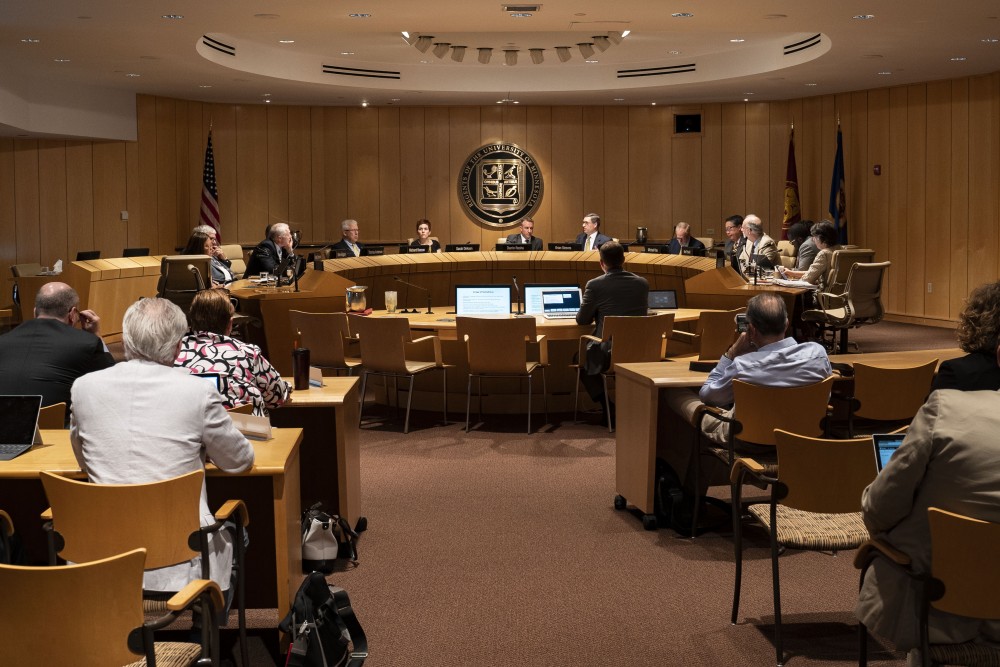Several University of Minnesota regents pushed back against a proposed tuition hike ahead of a vote to approve the budget on June 19, expressing a desire for a lower increase.
President Eric Kaler’s budget proposal, presented to the governing body on Thursday, includes a 2.5 percent increase in tuition for students on the Twin Cities campus.
At the meeting, Kaler likened the increase to “less than a dollar a day,” a statement that received criticism from regents and student leaders.
“I know students that cannot financially meet the basics of human existence with their current financial situation,” Mina Kian, Minnesota Student Association president-elect, said. “It’s unreasonable to go and view this to be a small amount of money.”
Uncomfortable with the current proposed tuition hike, some regents asked University administrators to detail potential impacts of a smaller increase in tuition before the June 19 vote.
As of Monday afternoon, regents had not received materials about these impacts.
Regent Michael Hsu said without a lesser tuition increase, he will not support this budget, favoring a move to lower tuition. Hsu said he could support an increase below the inflation rate, closer to 1 percent.
Regent Steve Sviggum said he anticipates a revised version of the budget will have a lower tuition increase, around 1.5 or 2 percent, a change he would support.
Sviggum said he met with Kaler about two weeks ago to address certain parts of the budget.
“I can say I had a chance to be heard,” Sviggum said. “I can’t say that what I was saying came forward in action in the budget. I understand not everyone is going to agree all the time.”
Sviggum said the budget creation process has been more open this year than in previous years and he would like to see it be even more inclusive of University stakeholders when President-designate Joan Gabel takes over July 1.
Regent Randy Simonson said he wants to lower tuition in the long run and has had conversations with Gabel about creating a strategic plan to lower tuition and identify other revenue sources to support the University.
Simonson said this would help regents have more influence on the budget earlier in the process and show the state legislature the University has a focused direction forward.
The budget needs to be approved before the start of the next fiscal year on July 1. If it is not approved at the June 19 meeting, regents and administrators would have less than two weeks to approve one.
If a budget is not passed in June, the board would likely pass a resolution to temporarily continue funding at current levels, according to a University spokesperson.
Little student input
A public forum about the budget on Friday was sparsely attended by students, with none of them addressing the board about tuition hikes.
“I think [students] probably think that it is hopeless,” Simonson said. “I think they didn’t show up because they didn’t think it would go anywhere anyway.”
Several regents said the budget process does not lend well to student participation, with some of the most important parts being decided in the summer when many students are not on campus.
“Even if they are not there, I still have to take their concerns into heart,” Regent Ilean Her said. “At the end of the day it is about balancing the budget, making sure that we honor our students and our staff and faculty, and making sure we have something that works for everybody.”
Regent Darrin Rosha took to Twitter after the meeting expressing his disappointment about the lack of students addressing the board about the tuition increase.
Student leaders said the University should have done more to invite students to participate in the discussion.
The University published an article on June 7 announcing the public forum for input on the budget, but the 2.5 percent tuition increase was not detailed, rather described as “below the 3 percent increase limit requested by the Minnesota Legislature.”
Kian said it is difficult to mobilize students during the summer as student groups they partner with are not active. Kian said she could not afford to fly back to campus for the meeting.
Austin Berger, MSA’s representative to the Student Senate Consultative Committee, said he doesn’t think MSA is doing enough to advocate for undergraduates and is too focused on preserving their relationship with University administration.
“We dropped the ball on that,” Berger said about MSA’s effort to get students to the meeting. “We should have been doing a lot more outreach, but what’s done is done.”







